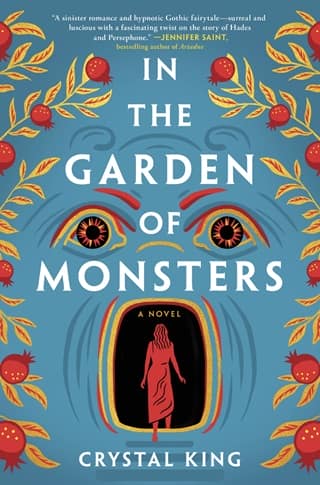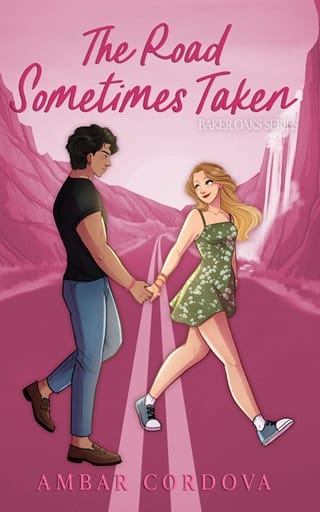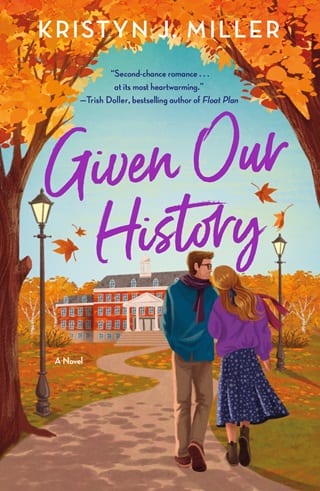Chapter 20
20
I awoke at dawn. The first rays of the morning sun had barely begun to filter through the trees. To my astonishment, there was no snow on the ground at all. The road from the boschetto to the village was clear.
A knock at the door jolted me from the view. It was Jack.
"You saw all the snow, didn't you?" I pointed to the window.
He nodded. "Snow squalls can be terrifying," he said, his voice holding a hint of condescension.
I wanted to scream at him. It wasn't just a squall. We had been trudging through several inches of snow by the time we reached the village gate. Ceres had sent the giants and the snow. She had purposefully tried to kill us. I couldn't even begin to explain it to him. Irritated, I pushed past him and made my way to the small salon.
Gala frowned when she saw Jack trailing behind me. "Did your friend turn up?" she asked, her tone making it clear that she was still annoyed. The look on my face must have said enough because she didn't wait for me to respond. "You should never have invited her here. It wasn't your place. You've ruined our last two days. We're not paying you for them."
I could only stare at her, mouth agape. Lillian was missing . I could hardly fathom how she could be so cruel.
"Now, now, Gala, darling, I think she's earned her pay," Jack said, sidling up to her.
She shrugged him off. " You certainly haven't."
Dalí gave me a sympathetic smile. "Worry not, my Proserpina. We will find your friend. And I will pay you." This last part was said in a conspiratorial whisper as Gala stepped aside to give Jack a dressing-down.
Ignazio appeared, a tray of pastries in his hand. "Take one, and we'll go search for Lillian. The truck is waiting."
I had no appetite. "Did you send for the commissario ?"
"Yes. He's gathering up his men—they're volunteers, mind you. I'll remain here to await them."
I was relieved but also concerned about such a small police force. After thanking Ignazio, I asked if we could go to the boschetto immediately. Though I didn't want to return to the garden, I was sure my friend was there, and I was anxious to begin the search for her. I didn't have high hopes of finding Lillian alive. Yet looking for her gave me purpose, something I could do. I had to at least find her, and for that I would brave Ceres's twisted wrath.
There wasn't any snow outside the garden, but once we left the truck and crossed over the makeshift bridge into the boschetto , I was surprised to see a dusting still remained. I shivered, not so much with the cold, but because the unnatural feeling of Sacro Bosco and its stone statues filled the air around me even more than usual as I stepped foot on the trail beyond the planks that crossed the stream.
I stopped the group at the fork in the path. "We should stick together," I said. I could see the giant head of Orlando Furioso on the lower path, the feet of the intact woodsman in his hands. With the woodsman disappearing from the road, I wasn't surprised to see the statues had returned to the proper places. But Lillian was missing, Paolo had a broken leg, and I did not doubt what I had seen in the snow the night before. Now the sight of the giant men made my heart pound faster.
"We would cover more ground if we split up," Jack reasoned. My jaw dropped.
"You can't be serious?" I said. But I hadn't told my companions about the horrible events of the night before and I knew they wouldn't understand my fear. They thought that Lillian had merely gotten lost in the snow.
"Excellent. Aniré per aquí. " I didn't understand Dalí's Catalan, but he immediately headed down the upper path toward the top of the Casa Pendente—and the statue of Ceres.
"No. You shouldn't go alone!" I yelled after him. He waved at me and kept going like he hadn't heard me.
Gala pointed up the trail past the toppled Etruscan mausoleum toward the tempietto . "It's daylight," she said, as though that negated any danger. "You go find Salvador. We'll check the Pegasus fountain." She nudged Jack in the direction of Orlando and the woodsman, past which were the fountains and the nymphaeum. Jack gave me a casual wave and went with her, ignoring my worry about being alone.
I flipped them the bird behind their backs, which gave me only the slightest modicum of satisfaction. But I was glad I would be traversing the opposite side of the boschetto from Ceres. I hoped Dalí would be all right when he reached her statue, but I had no intention of taking direction from Gala.
After she and Jack were out of sight, I backtracked and made my way through the brush to check the entrance to the secret passage. I called for Lillian, hoping that if she ended up there she might hear me. Silence. It was too dark for me to go far into the tunnel, so I was forced to abandon the passage and return to the garden.
As I passed the overturned mausoleum where I had first heard the whispers, I laid my hand upon the rock, wondering if I would hear them again, but everything was silent.
I spent the next fifteen minutes going over all the places where I thought Lillian might have hidden from the storm, starting with the most obvious—the tempietto , which was empty. Dreading the thought of finding her body, I tried not to imagine what wild animals might have gotten to her before we did. I looked in and around the little temple, around Cerberus and around the statues of the sirens. There was a little bit of patchy snow in this part of the boschetto , including on the bench of Proserpina, and enough to make the stairs slippery as I made my way down into the heart of the garden toward the area around the orco .
As I reached the bottom of the stairs, I spotted Dalí in the distance through the trees, across the bramble of weeds and bushes, standing over the open Etruscan tomb where he had last sketched me. He held a little sketchbook and a pen and was drawing furiously. The world seemed to shrink around me, tunneling my vision into a point, the point where his pen hit the paper. I knew what he was drawing.
I ran toward Dalí, past the worn statue of Aries's ram, until I came to the edge of the tomb. And there was Lillian, her coat gone, her shirt ripped open, exposing her left breast. Snow covered her stomach and legs. One arm was slung over her head, resting on the edge of the tomb, her fingers reaching upward. Her eyes and mouth were open, caught in a moment of pure terror. As I stared at her body in shock, an astonishing, iridescent green beetle climbed out of her mouth.
Screaming, I fell to my knees at the side of the tomb. I was vaguely aware of Dalí backing away and stuffing his notebook in his coat, but the only thing I understood in that moment was that my friend was dead.
My words from the day before ripped through me. You're just jealous. You wish it was you lying here, cold and naked for the whole world to view.
I did this to her. I should never have brought Lillian to Bomarzo.
At some point, I became aware of others gathered around us, then Ignazio helping me up, his hands hot, his smoke enveloping me with an odd comfort. "Oh, Julia," he whispered. "Julia, I'm so sorry. This should never have happened." In his embrace, I felt his deep sorrow—not for Lillian, but the sorrow he had for me.
A tall man with curly dark hair, a mustache, and gray suit stood at the edge of the tomb, barking orders in some unintelligible Italian dialect. The commissario. Ignazio led me away, telling me that the inspector would take care of everything. I didn't have the energy to tell him he was wrong. There was nothing for the commissario to take care of. Lillian was dead. She was dead because of me—because I dragged her there.
I barely registered Ignazio whisking me away to the palazzo and providing me with some sort of liquor I willingly drank to dull the pain in my heart. Heading outside, I sat on the terrace, staring down at the boschetto , at the little figures I could see moving among the trees, combing the garden for clues, the commissario peppering Gala, Jack, and Dalí with questions.
He would later ask the same questions of me. But for a long while, I just stared down at the boschetto , my heart a dull, empty thing. Ignazio sat there with me, but he did not do or say anything. I don't know what I would have done if he had tried to talk with me, or touch me, even in sympathy. He hadn't been the one to harm Lillian—somehow, I was sure of it—but he was wrapped up in all this, and I didn't have a single iota of trust in him. But he only sat there with me, and for that, I was glad.
The commissario was gentle with me and my less-than-stellar Italian, and I was relieved I didn't seem to be under any suspicion. But I didn't tell him what really had happened—how could I? We got caught in the storm and one moment Lillian was behind me and the next she wasn't. We went down to the boschetto to see what it was like at night. No, we didn't see any other people in the garden. No, I didn't know her family, but she had an aunt in Rome whom I had never met. Yes, I knew where she worked. Yes, I loved her. Yes, she was my best friend.
"Will you help me return to Roma?" I asked the commissario as the interview was ending.
He pursed his lips. "You will all need to remain here until we have concluded our investigation."
"Even Dalí?" I asked.
The commissario chuckled. "No man is above the law, signorina. Not even him."
My guess was that Gala had not yet had a chance to grease this man's palm. I could easily see them departing quickly if she gave him enough cash.
Besides, neither Dalí nor Gala knew what had happened out in the storm. And when they questioned Paolo on the morrow he wouldn't give up the truth either. The mental hospitals in Italy were known to be torturous places, and neither of us wanted to end up in one.
I went to Paolo that afternoon and sat in the chair at the edge of his bed until he awoke. I wanted to be the one to tell him about Lillian. The doctor had come while we were in the boschetto and had set his leg with plaster. A pair of crutches leaned against the wall.
After I told him about Lillian, he asked me to help him sit up. Once he was upright, his head and back against the backboard, he patted the spot next to him. "Come here." I climbed onto the bed next to him and he held me while I cried.
I sobbed long and hard, and he let me.
"What happened when you went back for her?" I asked.
"I don't know. I must have slipped."
"I wish you could have known her better," I told him. "I am sorry for that."
"Do not be sorry. I am glad she was in my life, even if for just a couple of days. She loved you, Julia. Cherish her memory. Remember all you learned from her, all you loved about her. Let those memories be your solace when darkness looms."
We sat in silence for a few minutes. My tears had dried, and a little shell was starting to form around my heart, hard and protective.
"I think I will eat the last seed," I finally said.
He pulled back to look me in the eye.
"No, Julia, no, you must not."
"Lillian died because I wouldn't give in to the forces of the boschetto ," I said. "I don't know why they want me to, but it seems like I should, regardless of what will happen to me. I don't want anyone else to suffer the same fate because of me."
"Julia, you'll die."
I nodded. "I think that's true."
"You can't give in to them, Julia. Think of all the ghosts. You'll become one of them. You don't want that terrible fate, roaming around Bomarzo till the end of time."
"If I don't, you might die. Dalí or Jack or Gala might die. Lillian's death was a terrible one. She died in fear. In total, abject terror. Whatever killed her will come for all of you."
Paolo shook his head. "You don't know that. Anything could have happened to Lillian. Don't do this, Julia, please. Lillian wouldn't want you to."
I had been sure of my decision until he said these last words. He was right. Lillian would not want me to. She would want me to fight these forces, to defy them.
But look what defying them had gotten her.
When I left Paolo, I searched for Dalí and found him on the terrace, thankfully alone, painting the valley before him. I was surprised to see trees cropping up on his canvas—he was fonder of the desert, of clean lines that served as a backdrop to his surreal visions.
"I'd like to see the sketchbook I saw you with earlier," I said to him, no longer caring if I got paid or if I sat for him again.
He set down his brush. "I don't think you need to..."
"I do."
He stared at me, but I refused to budge. I held out my hand expectantly.
He seemed unsure what his course of action should be. I don't think many women had been stern with him except for Gala, and perhaps his mother, long ago. He reached into his coat pocket and handed me the worn Moleskine. In his eyes, I saw something that I don't know if many had ever seen or might ever see from him again—shame.
I flipped through the notebook, past images of me, Gala, slippery clocks, fuzzy bees, partially imagined humans, spindly elephants, and strange landscapes. Finally, I came upon the sketch he had been making at the edge of the Etruscan grave. Lillian's terror stared up at me, her breast bared, her leg and arm askew. I hated how talented he was. I hated that he had captured the image so perfectly. And in that moment, I hated him.
The thought of slapping him, as I had seen women do in movies, crossed my mind. But I knew that for Dalí, that would mean little. His face was just skin and bone; his art was his soul.
Instead I ripped the drawing out of the book, holding the delicate paper up to his eyes so he could see the destruction. Dalí's face paled; he looked as though I had struck him physically. His lips quivered, but he said nothing.
When I handed the Moleskine back to him, his eyes would not meet mine. I went to the edge of the terrace and ripped up the sketch, letting the pieces float in the wind, dropping to the boschetto below like fallen snow. I watched them fly away, my heart broken into as many pieces.
He came and stood next to me, and we looked out toward the garden. He didn't apologize for his drawing. Even if the thought had occurred to him, I don't think he had the slightest idea how to do so. I had destroyed something irreplaceable, something that had sprung from his twisted, brilliant mind. And I felt no remorse.
"Salvador." Gala's call sounded like a command and the artist took it as such, turning at once and going to her. "We can't leave for at least a few days," she said stoically.
So, the commissario hadn't taken her bribe after all.
"You need to get back to work on the sets for the Opera, but now we're stuck here." She sneered at me, her tone accusatory.
This time, I didn't resist the urge to slap her. But as my hand connected with her face, I realized that real life was not like the movies. There was no orchestral swell, no gasping audience. There was only the sound of flesh against flesh, the sharp sting in my palm, and the look of pure shock in Gala's eyes.
Her mouth dropped into an O of surprise, but if she said anything to me, I didn't hear her. I had already stepped back inside.
 Fullepub
Fullepub 



